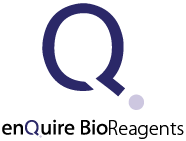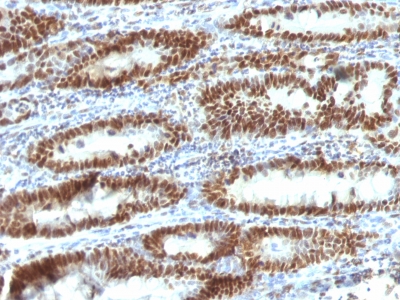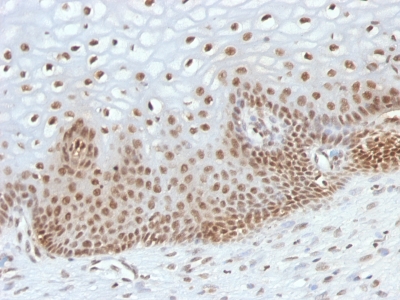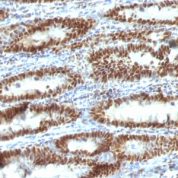Human Anti-TOX3 / TNRC9 Antibody Product Attributes
Species: Human
Tested Applications: Flow Cytometry, Immunofluorescence, Immunohistochemistry (IHC).
Application Notes: Flow Cytometry (0.5-1ug of antibody/million cells in 0.1ml), Immunofluorescence (0.5-1ug of antibody/ml), Immunohistochemistry (IHC) (Formalin-fixed) (0.5-1ug of antibody/ml for 30 minutes at RT)
Clonality: Monoclonal
Anti-TOX3 / TNRC9 Antibody Clone: TOX3/1123
Clone TOX3/1123 Host and Isotype: Mouse IgG2b kappa
Anti-Human TOX3 / TNRC9 Positive Control Sample: SH-SY5Y, MDA-MB-435 cells. Brain or breast or gastric Carcinoma.
Cellular Localization of Antibody Cytoplasmic & Nuclear
Buffer and Stabilizer: 1mM PBS with 0.05% BSA & 0.05% azide.
Antibody Concentration: 200ug/ml
Antibody Purification Method:Protein A/G Purified
Immunogen: Recombinant fragment (139 Amino acid residues around aa 200-400) of human TOX3 protein
Storage Conditions: Store at 2 to 8° C (refrigerate). Stable for 24 months when properly stored.
TOX3 / TNRC9 Previously Observed Antibody Staining Patterns
Observed Subcellular, Organelle Specific Staining Data:
Anti-TOX3 antibody staining is expected to be primarily localized to the nucleoplasm.Observed Antibody Staining Data By Tissue Type:
Variations in TOX3 / TNRC9 antibody staining intensity in immunohistochemistry on tissue sections are present across different anatomical locations. An intense signal was observed in Purkinje cells in the cerebellum. More moderate antibody staining intensity was present in Purkinje cells in the cerebellum. Low, but measureable presence of TOX3 / TNRC9 could be seen inglandular cells in the appendix, glial cells in the caudate nucleus, cells in the molecular layer in cerebellum, glial cells in the cerebral cortex, glandular cells in the colon, peripheral nerve/ganglion in colon, glial cells in the hippocampus, cells in the tubules in kidney, glandular cells in the prostate, rectum and stomach and Leydig cells in the testis. We were unable to detect TOX3 / TNRC9 in other tissues. Disease states, inflammation, and other physiological changes can have a substantial impact on antibody staining patterns. These measurements were all taken in tissues deemed normal or from patients without known disease.Observed Antibody Staining Data By Tissue Disease Status:
Tissues from cancer patients, for instance, have their own distinct pattern of TOX3 / TNRC9 expression as measured by anti-TOX3 / TNRC9 antibody immunohistochemical staining. The average level of expression by tumor is summarized in the table below. The variability row represents patient to patient variability in IHC staining.| Sample Type | breast cancer | carcinoid | cervical cancer | colorectal cancer | endometrial cancer | glioma | head and neck cancer | liver cancer | lung cancer | lymphoma | melanoma | ovarian cancer | pancreatic cancer | prostate cancer | renal cancer | skin cancer | stomach cancer | testicular cancer | thyroid cancer | urothelial cancer |
|---|---|---|---|---|---|---|---|---|---|---|---|---|---|---|---|---|---|---|---|---|
| Signal Intensity | - | - | - | - | - | - | - | - | - | - | - | - | - | - | - | - | - | - | - | - |
| TOX3 Variability | + | ++ | ++ | ++ | + | + | ++ | + | + | + | + | + | ++ | + | + | ++ | + | + | + | ++ |
Limitations and Warranty
enQuire Bio's TOX3 / TNRC9 Anti-Human Monoclonal is available for Research Use Only. This antibody is guaranteed to work for a period of two years when properly stored.






There are no reviews yet.